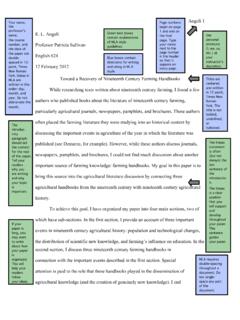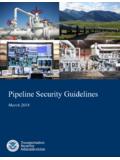Transcription of Suggested Meeting Format - aanapa.org
1 A Suggested Format for conducting an Meeting 1. Good Evening ladies and gentlemen. This is the regular Meeting of the _____ group of Alcoholics Anonymous. My name is_____and I am an alcoholic and your Secretary. 2. Let us open the Meeting with a moment of silence to do with as you wish followed by the Serenity Prayer: God, grant me the serenity to accept the things I cannot change, Courage to change the things I can, and Wisdom to know the difference. 3. Alcoholics Anonymous is a fellowship of men and women who share their experience, strength and hope with each other that they may solve their common problem and help others to recover from alcoholism. The only requirement for membership is a desire to stop drinking. There are no dues or fees for AA membership; we are self-supporting through our own contributions.
2 AA is not allied with any sect, denomination, politics, organization or institution; does not wish to engage in any controversy; neither endorses nor opposes any causes. Our primary purpose is to stay sober and help other alcoholics to achieve sobriety. 4. _____will now read How it Works from Chapter 5 of the Big Book. (note: Some groups ask other members to read the Steps and/or Traditions) 5. If it is the custom of the group: Ask any new members to introduce themselves by their first name only--a new member is anyone who has a desire to stop drinking and is within their first thirty days in AA. Ask any visitors to introduce themselves and say where they are from. 6. Introduce the Chairperson or Speaker for the evening. If yours is a discussion type Meeting , the Secretary conducts the discussion.
3 7. Thank the Speaker or Chairperson as well as any others who read. 8. Make regular announcements about group business, events and announcements from The Point newsletter, and information about the availability of literature. Ask for announcements from the floor. 9. Pass the basket(s). The secretary can say something like: We have no dues or fees in We are entirely self-supporting, declining outside contributions. This self-support includes our rent for this room, the coffee and refreshments, and contributions to our Central Office, the New York Office and to General Service. The pink can is for loose change to buy literature for the Hospitals & Institutions Committee to carry the message to those unable to get to outside meetings. 11. Close the Meeting with the Lord s Prayer, or any other prayer determined by group conscience.
4 (NOTE: Make every effort to open and close the Meeting on time. This Format is Suggested only)How It Works Rarely have we seen a person fail who has thoroughly followed our path. Those who do not recover are people who cannot or will not completely give themselves to this simple program, usually men and women who are constitutionally incapable of being honest with themselves. There are such unfortunates. They are not at fault; they seem to have been born that way. They are naturally incapable of grasping and developing a manner of living which demands rigorous honesty. Their chances are less than average. There are those, too, who suffer from grave emotional and mental disorders, but many of them do recover if they have the capacity to be honest. Our stories disclose in a general way what we used to be like, what happened, and what we are like now.
5 If you have decided you want what we have and are willing to go to any length to get it then you are ready to take certain steps. At some of these we balked. We thought we could find an easier, softer way. But we could not. With all the earnestness at our command, we beg of you to be fearless and thorough from the very start. Some of us have tried to hold on to our old ideas and the result was nil until we let go absolutely. Remember that we deal with alcohol cunning, baffling, powerful! Without help it is too much for us. But there is One who has all power that One is God. May you find Him now! Half measures availed us nothing. We stood at the turning point. We asked His protection and care with complete abandon. Here are the steps we took, which are Suggested as a program of recovery: The Twelve Steps 1.
6 We admitted we were powerless over alcohol - that our lives had become unmanageable. 2. Came to believe that a Power greater than ourselves could restore us to sanity. 3. Made a decision to turn our will and our lives over to the care of God as we understood Him. 4. Made a searching and fearless moral inventory of ourselves. 5. Admitted to God, to ourselves, and to another human being the exact nature of our wrongs. 6. Were entirely ready to have God remove all these defects of character. 7. Humbly asked Him to remove our shortcomings. 8. Made a list of all persons we had harmed, and became willing to make amends to them all. 9. Made direct amends to such people wherever possible, except when to do so would injure them or others. 10. Continued to take personal inventory and when we were wrong promptly admitted it.
7 11. Sought through prayer and meditation to improve our conscious contact with God as we understood Him, praying only for knowledge of His will for us and the power to carry that out. 12. Having had a spiritual awakening as the result of these steps, we tried to carry this message to alcoholics, and to practice these principles in all our affairs. Many of us exclaimed, What an order! I can t go through with it. Do not be discouraged. No one among us has been able to maintain anything like perfect adherence to these principles. We are not saints. The point is, that we are willing to grow along spiritual lines. The principles we have set down are guides to progress. We claim spiritual progress rather than spiritual perfection. Our description of the alcoholic, the chapter to the agnostic and our personal adventures before and after make clear three pertinent ideas: (a) That we were alcoholic and could not manage our own lives.
8 (b) That probably no human power could have relieved our alcoholism. (c) That God could and would if He were sought. Reprinted from Alcoholics Anonymous, pages 58 - 60, with permission from World Services, Inc. THE TWELVE STEPS of Alcoholics Anonymous 1. We admitted we were powerless over alcohol - that our lives had become unmanageable. 2. Came to believe that a Power greater than ourselves could restore us to sanity. 3. Made a decision to turn our will and our lives over to the care of God as we understood him. 4. Made a searching and fearless moral inventory of ourselves. 5. Admitted to God, to ourselves, and to another human being the exact nature of our wrongs. 6. Were entirely ready to have God remove all these defects of character.
9 7. Humbly asked Him to remove our shortcomings. 8. Made a list of all persons we had harmed, and became willing to make amends to them all. 9. Made direct amends to such people wherever possible, except when to do so would injure them or others. 10. Continued to take personal inventory and when we were wrong promptly admitted it. 11. Sought through prayer and meditation to improve our conscious contact with God as we understood Him, praying only for knowledge of His will for us and the power to carry that out. 12. Having had a spiritual awakening as the result of these steps, we tried to carry this message to alcoholics, and to practice these principles in all our affairs. The Promises If we are painstaking about this phase of our development, we will be amazed before we are half way through.
10 We are going to know a new freedom and a new happiness. We will not regret the past nor wish to shut the door on it. We will comprehend the word serenity and we will know peace. No matter how far down the scale we have gone, we will see how our experience can benefit others. That feeling of uselessness and self-pity will disappear. We will lose interest in selfish things and gain interest in our fellows. Self-seeking will slip away. Our whole attitude and outlook upon life will change. Fear of people and of economic insecurity will leave us. We will intuitively know how to handle situations which used to baffle us. We will suddenly realize that God is doing for us what we could not do for ourselves. Are these extravagant promises? We think not.






